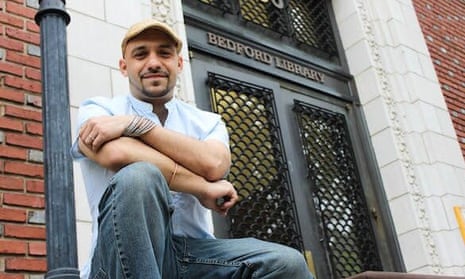It’s fair to say that Daniel José Older is having a very good year.
In the first week of 2015, Penguin published his first novel, Half-Resurrection Blues. By the end of January, Anika Noni Rose’s production company had optioned the film and television rights to the book, as well as rights for the following two in the series. This week sees him publish a hotly anticipated young adult novel called Shadowshaper.
To top it off, he got married in March.
Until 2014, Older worked by day as an emergency medical technician in Manhattan. He wrote mostly at night. And he sees himself, explicitly, as an outsider to the literary and publishing scene: “I entered the writing work clearly and strategically to do this thing, to write these books, to get them into the world and fuck with people, and to generally fuck shit up,” he says at a restaurant in Brooklyn.
Shadowshaper is set in the Bedford-Stuyvesant neighbourhood of Brooklyn, where Older lives. The protagonist, a young Afro-Latina named Sierra, learns about her family’s history of supernatural powers. She can, as it turns out, interact with the spirit world. Her family has gone to great lengths to conceal that fact from her, but now it’s Sierra’s responsibility to protect them from what’s coming.
Older’s imagined Brooklyn is full of danger, less gentrified than the real-life version, and decidedly diverse. “We’re doing something very political by deciding whose life matters, where we’re going to focus things, and who we erase from the picture,” he says. This kind of diversity, he feels, is lacking in most other fantasy YA novels. “When we create worlds based on this world that don’t include diversity, we’re lying,” he says. “We’re not being honest as authors. Even if it’s infused with magical powers, or zombies, or whatever you’ll have, we should still be trying to tell the truth. Then, it becomes a question of what truth, how are we telling it, and whose truth do we take the time to repeat?”
Older is critical of books that he says fail to include racial diversity – such as, he says, The Hunger Games. He chalks it up to a “phenomenal lack of imagination” on the part of the author, and a laziness, he feels, that is designed to keep some people out of the picture. “To be able to figure out all these quirky things about what you imagine the future will be like, and not somehow have any folks of colour doing anything heroic or worthwhile in it, what happened?” he asked. “Where did we go?”
This disappointment, he says, made him more engaged as an author. He teaches writing to children and speaks on multiple panels for book conferences and writers’ conventions. Last year, he wrote for the Guardian about his attempt to get the World Fantasy Award to replace the bust of HP Lovecraft as its statuette with one of the black science fiction writer Octavia Butler.
Older also values the supportive community of fellow writers of colour. His mentors have been black female fantasy and science fiction writers like Sheree Renée Thomas and Tananarive Due, who pointed out to him that black women are rarely positioned as protagonists. With Sierra, Older is trying to live up to what he feels is his responsibility to change that.
Shadowshaper betrays that aim in other ways, too. The decisions of her elders help Sierra discover her own power and the family history that’s followed her into the perilous streets of Bed-Stuy. The book begins with her grandfather muttering, “Lo siento, lo siento …”
Older’s combative style can make you wonder how he defines success. “Success means I’ve inspired people – specifically people of colour – to write and tell their stories and see themselves as humans. The emails I read ...” Tears come to his eyes.
“In some of my stories, people saying they could see themselves in a place they never thought they would, and now they knew they could write their own stories. That’s mission accomplished. Fuck a Hugo award. I got an email like that in my inbox. Recognition is cool, but I’m here to change lives on that level.”

Comments (…)
Sign in or create your Guardian account to join the discussion